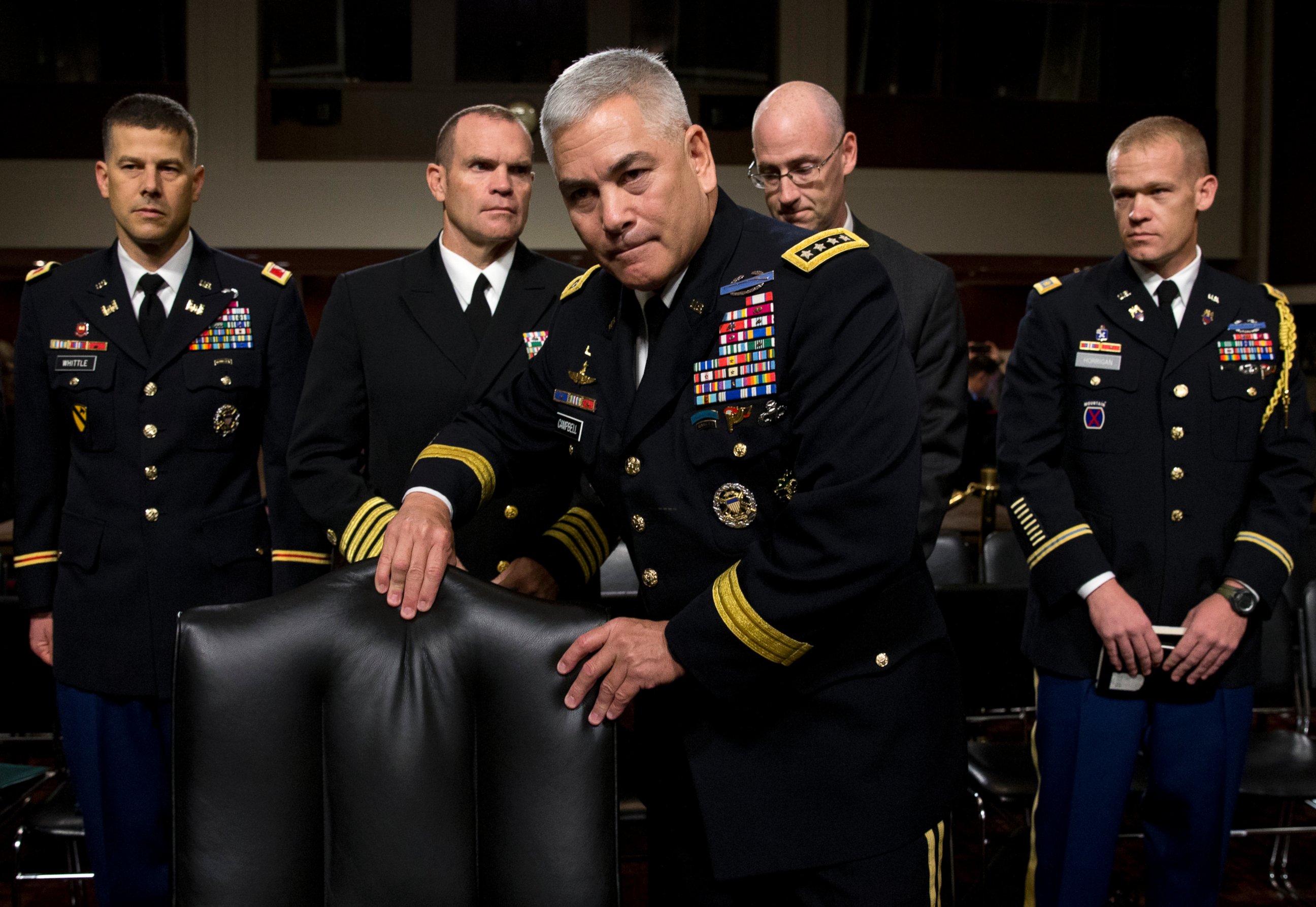US 'Mistakenly Struck' Kunduz Hospital, Gen. Says
Gen. John Campbell testifies before Congress today.
— -- Gen. John Campbell, the top U.S. commander in Afghanistan, today called the recent airstrike on a hospital in the northern city of Kunduz a mistake.
The U.S. chain of command decided to conduct the operation and the hospital was "mistakenly struck,” he told the Senate Armed Services Committee of the incident that left 22 people dead.
"We would never intentionally target a protected medical facility," he told the senators. "I must allow the investigation to take its course and, therefore, I’m not at liberty to discuss further specifics at this time. However, I assure you that the investigation will be thorough, objective and transparent.”
And in light of the Kunduz airstrike, Campbell said he has ordered retraining personnel on the rules of engagement.
“To prevent any future incidences of this nature, I've directed the entire force to undergo in-depth training in order to review all of our operational authorities and rules of engagement,” he said.
The rules for U.S. and Afghan troops in Afghanistan requesting airstrikes are that they can be called in for counterterrorism strikes, force protection or, in extreme situations, to prevent casualties.
Although the airstrikes on the Doctors Without Borders hospital were requested by Afghan forces, Campbell said, they were approved by the U.S. chain of command.
“The Afghan forces on the ground requested air support from our forces there on the ground," he explained, "but as I said in my opening statement, even though the Afghans requested air support, it still has to go through a rigorous U.S. procedure to enable fires to go on the ground.”
Campbell added: "We had a special operations unit that was in close vicinity that was talking to the aircraft that delivered those fires.”

After the general told reporters Monday that Afghan forces who were under attack by the Taliban requested the U.S. airstrikes, Doctors Without Borders/Médecins Sans Frontières (MSF) said in a statement, "The U.S. government has admitted that it was their airstrike that hit our hospital in Kunduz and killed 22 patients and MSF staff. Their description of the attack keeps changing – from collateral damage, to a tragic incident, to now attempting to pass responsibility to the Afghanistan government. The reality is the U.S. dropped those bombs. The U.S. hit a huge hospital full of wounded patients and MSF staff."
The U.S. military is participating in three investigations into the airstrike, an internal military investigation headed by Brigadier Gen. Rich Kim and joint investigations with the Afghan government and NATO.
“We are reaching out again to Doctors Without Borders and the personnel on site,” Campbell said today. “Making sure that we get all sides of the story.”
Campbell said Kim had already spoken with some of the witnesses in Kunduz and he “is continuing to try to get out to locations where he can talk to doctors, nurses, survivors … and make sure he gets all that story. And we will certainly share all of that.”
In terms of troop levels there, Campbell also confirmed to the committee today that he has presented recommendations to the White House that would revise the planned drawdown of all 9,800 U.S. troops by the end of next year. U.S. officials have told ABC News that the options range from continuing with the drawdown, a mid-range option of 5,000 troops and a high-end that would keep 8,000 U.S. forces in Afghanistan.
Campbell said a reduction in forces by 2017 remains the “planning assumption,” but “much has changed” since the drawdown plan was decided in mid-2014, when President Obama's decision “did not take into account the changes over the past two years.”
That included the rise of ISIS-affiliated groups in Afghanistan, the influx of Taliban fighters pushed out of Pakistan’s tribal areas by a Pakistani military offensive, and a new unity government in Afghanistan favorable to a continued presence of U.S. troops beyond 2016.
"As a result," he said, "I’ve put forward recommendations to adjust this new environment while addressing our missions, train, advise and assist the Afghan Security Forces and conduct counterterrorism missions to protect the homeland."
The drawdown plans would leave about 1,000 U.S. military personnel to provide embassy protection and work at a security cooperation office working with the Afghan government on oversight of Afghan military sales.
An “embassy-based presence” would not allow the United States to continue to advise and assist the Afghan military and also maintain a counterterrorism mission against increased Taliban and ISIS activity in Afghanistan beyond 2016, according to Campbell.
He said Afghanistan’s air force still requires additional training and is hampered by a low number of operational aircraft.
“I believe we still have to train, advise, assist at certain levels for aviation, for logistics, for intelligence, for special operating forces. I believe we have to have a counterterrorism capability. And you need a certain amount of forces to be able to do that,” Campbell said.
He added, “The options I provided provide pros and cons of different levels of support above and beyond the 1,000. I base that based on my experience on the ground, and the conditions I've seen.”




